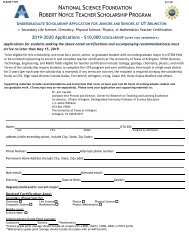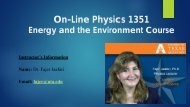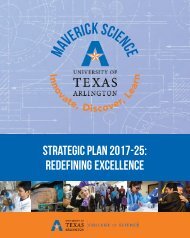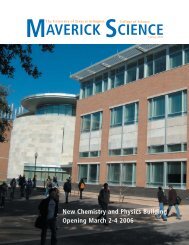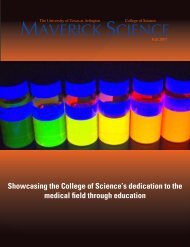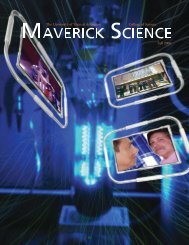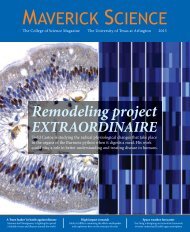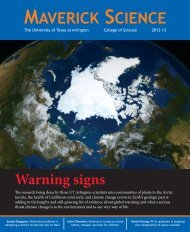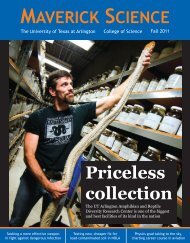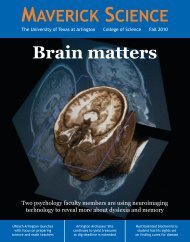Maverick Science mag 2013-14
Create successful ePaper yourself
Turn your PDF publications into a flip-book with our unique Google optimized e-Paper software.
Mandal, shown with members of his lab, clockwise from top left: Arunoday Bhan, Mandal, Shyam<br />
Prakash, Paromita Deb and Aarti Bashyal.<br />
“As my primary education is in chemistry, I always<br />
wanted to be a chemist,” he said. “However,<br />
as I studied more and more biology, I wondered<br />
more and more how cells function, how life functions,<br />
and how genomes are organized and function.”<br />
Mandal’s research focuses on histone modification,<br />
gene regulation and epigenetics in the human<br />
system. Histones are groups of basic proteins present<br />
in the nuclei of cells that form nucleosomes,<br />
which are sections of DNA that are wrapped tightly<br />
around a core of histones, like spools of thread.<br />
Gene regulation is the process of turning genes<br />
on and off. Early in their development, cells begin<br />
to take on specific functions, and gene regulation<br />
ensures that the right genes are expressed at the<br />
right times. Gene regulation can also help an organism<br />
respond to its environment. It is accomplished<br />
by a variety of mechanisms including<br />
chemically modifying genes and using regulatory<br />
proteins to turn genes on or off.<br />
Epigenetics is the study of external modifications<br />
to DNA that turn genes on or off. These modifications<br />
do not change the DNA sequence, but<br />
they do affect how cells read genes. Epigenetic<br />
changes alter the physical structure of DNA. These<br />
changes are not solely genetic, but are influenced<br />
by environmental stimuli such as hormones and<br />
nutrients.<br />
“My primary research interest is to understand<br />
the epigenetic mechanism of gene expression and<br />
its regulation in humans,” Mandal said. “This area<br />
of research has profound consequences in understanding<br />
the mechanism of gene regulation, chromatin<br />
(a complex of nucleic acids and proteins in<br />
the cell nucleus that condenses to form chromosomes<br />
during cell division) dynamics and various<br />
human diseases including cancer and cardiovascular<br />
diseases.”<br />
Though not even a decade into his career, Mandal<br />
has established a reputation as a top-notch researcher.<br />
He earned a Texas Advanced Research<br />
Program grant in 2006 and since then he has<br />
helped secure over $2 million in funding for projects<br />
with which he’s been involved. In May he was<br />
chosen to receive the College of <strong>Science</strong> Outstanding<br />
Research Award, given annually to a faculty<br />
member who makes critical contributions to their<br />
field in the area of research.<br />
“Dr. Mandal is a quality teacher and a top-rate<br />
biochemist,” said Rasika Dias, professor and chair<br />
of the chemistry and biochemistry department. “He<br />
is a good team player who collaborates closely with<br />
a wide group of scientists at UT Arlington and<br />
around the world. He has established a world-class<br />
research laboratory to study gene regulation mechanisms<br />
and to develop treatments for diseases resulting<br />
from out of control genes. He is also an<br />
expert on hormone action, such as the effect of estrogen<br />
on breast cancer. We’re proud to have him<br />
as a colleague in our department.”<br />
M<br />
andal’s lab is a busy<br />
place, as he has numerous<br />
research projects<br />
going on at any<br />
given time. One current<br />
project involves<br />
understanding the epigenetics<br />
of cancer biology,<br />
tumor microenvironment and targeted therapy.<br />
In the past six months Mandal and his students<br />
had papers published in the journals<br />
Oncogene and the British Journal of Cancer detailing<br />
their investigation of the epigenetics of tumor<br />
microenvironment in vivo using mice models of<br />
human cancer.<br />
“Understanding the tumor microenvironment<br />
and the signaling mechanism that controls tumor<br />
growth, angiogenesis, and metastasis, is critical for<br />
developing novel and effective cancer therapy,”<br />
Mandal said.<br />
In the Oncogene manuscript, which he co-authored<br />
with former postdoctoral fellow Khairul<br />
Ansari and postdoctoral researcher Sahba Kasiri,<br />
Mandal demonstrated that mixed lineage leukemia<br />
(MLL), a gene which is associated with blood cell<br />
differentiation and leukemia, is closely involved in<br />
vasculogenesis and angiogenesis (mechanisms<br />
which implement the formation of the vascular network<br />
in the embryo). MLL is also a chromatinmodifying<br />
enzyme that controls gene expression<br />
and chromatin dynamics in human cells. His group<br />
also found for the first time that MLL1 is critical for<br />
hypoxia signaling and tumor growth, and that antisense-mediated<br />
targeting of MLL1 results in<br />
tumor growth inhibition in a mice model. Hypoxia<br />
signaling and angiogenesis are major trademarks<br />
that help tumors grow and metastasize. Molecules<br />
that inhibit angiogenesis are potential anti-cancer<br />
drugs.<br />
“Because MLL1 is so crucial to angiogenesis and<br />
tumor cell proliferation, gene targeting to MLL1 resulted<br />
in tumor suppression of tumor growth in<br />
pre-clinical models of human cancer,” Mandal said.<br />
“This is the first time in literature to show that an<br />
<strong>Maverick</strong> <strong>Science</strong> <strong>2013</strong>-<strong>14</strong><br />
25



